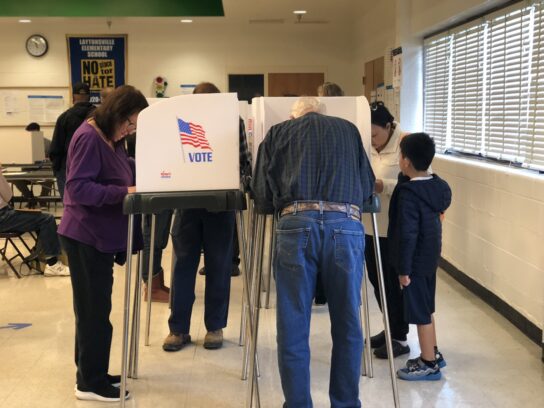
If you are feeling anxious about the upcoming Presidential election, you are not alone. A new Associated Press-NORC Center for Public Research poll found about 7 in 10 Americans are feeling anxious or frustrated about the campaign. Only about one third said they feel excited.
The poll results are similar to a Harris Poll conducted two months ago on behalf of the American Psychological Association.
That survey found 77% of Americans said the future of the country is a significant source of stress in their lives. While the economy was the biggest stressor (73%), the U.S. presidential election was a close second (69%).
Majority of People are Worried
Dr. Denise Dewhurst is a psychology professor at Montgomery College. She also is a licensed psychologist in Maryland and has her own private practice. She said the upcoming election is what all of her patients are talking about.
“There’s a lot of fear, a lot of anxiety. I hear that from my students. I hear it from my private practice clients. I hear it from friends. I hear it from colleagues at the College,” Dewhurst told MCM.
“People are really worried, regardless of which side they are on. They are really worried,” Dewhurst added.
Campaign Messaging
She said the tone of the campaign has exacerbated people’s feelings.
“Elections play on catastrophic fears. You look at the campaign ads. Some tell us your current way of life is threatened unless you vote this way. You hear there are bad people around. So you hear that over and over again, and it is hard not to buy in or get anxious. It is kind of a normal response to all this negative messaging,” Dewhurst said.
Strategies to Lessen Anxiety
Olufunmilayo Sholola is a clinical social worker and therapist with the Employee Assistance Program at Adventist HealthCare in Rockville.
She had some important strategies people can use to lessen their anxiety and stress. Sholola recommends people limit their news consumption.
“Constant updates from news and social media can feel overwhelming. Limiting your exposure gives you a sense of control over what you consume,” Sholola said.
She also suggests people engage in self-care such as meditation, exercise, mindfulness exercises, reading, or spending time with loved ones. She said that can foster calm and reduce anxiety.
Sholola also said it is important for people to share their thoughts with family and friends or confide in someone a person trusts.
Dewhurst said it is important for people feeling anxious or fearful to take care of themselves.
“Make sure you are eating right. Make sure you are sleeping. Go for a walk in nature. Slow your breathing, and try relaxation exercises. When we feel anxious our muscles get tense and anxious. Our brain reads that as we’re under alarm. Then your psychological feelings increase. The two feed off each other. So if you can reduce the muscle anxiety, the muscle tension, you can reduce the anxiety,” Dewhurst explained.
Signs of Anxiety
If someone is feeling anxious or fearful, he or she may exhibit some tell-tale signs. Dewhurst said those can include lack of concentration or attentiveness. People may have trouble interacting with others and having a normal conversation. They may not eat or sleep right.
Some people can fall into depression if their symptoms persist or get worse. Some warning signs are when a person is not able to get through the activities that they are normally supposed to do. Other signs can include if a person is not productive at work, or is not taking care of their family. Another sign is if a person starts using substances to cope with his or her feelings.
Sholola said if sadness or depression persist, then it is important to seek out a mental health professional.
She said Shady Grove Medical Center has resources to support mental health needs, including counseling and stress management tools.
Election Results May Not Relieve Anxiety
When the election is over, some people still may feel anxious even if their candidate wins.
“People may feel good initially. Some may feel a little worried like is it going to go smoothly,” Dewhurst said.
Others may remember the aftermath of the 2020 election. That could also trigger some fear and anxiety in people.
“The aftermath of the 2020 election created high levels of stress, anxiety, and, for some, even symptoms of PTSD. If individuals felt unsafe or overwhelmed by those events, election time can trigger flashbacks, hypervigilance, or mood changes,” Sholola told MCM.
Anxiety in Recent Elections
Dewhurst said while people admittedly are on edge right now, she counseled patients in 2016 and 2020. Anxiety levels also were high back then.
“So in 2016, I had people flooding my office after the election. They were in disbelief of what happened and what was going to happen. There was a lot of fear and anxiety about how this was going to play out. Remember we are in a blue state. In 2020, there was much more relief,” Dewhurst said.
“The country has been so divided now for the last eight years or more that this is really tough. The election is not going to solve that,” Dewhurst added.
If a person is anxious or fearful about the election, he or she should try some coping mechanisms to reduce stress. However, if symptoms persist, people should seek out professional help.

Comments are closed.